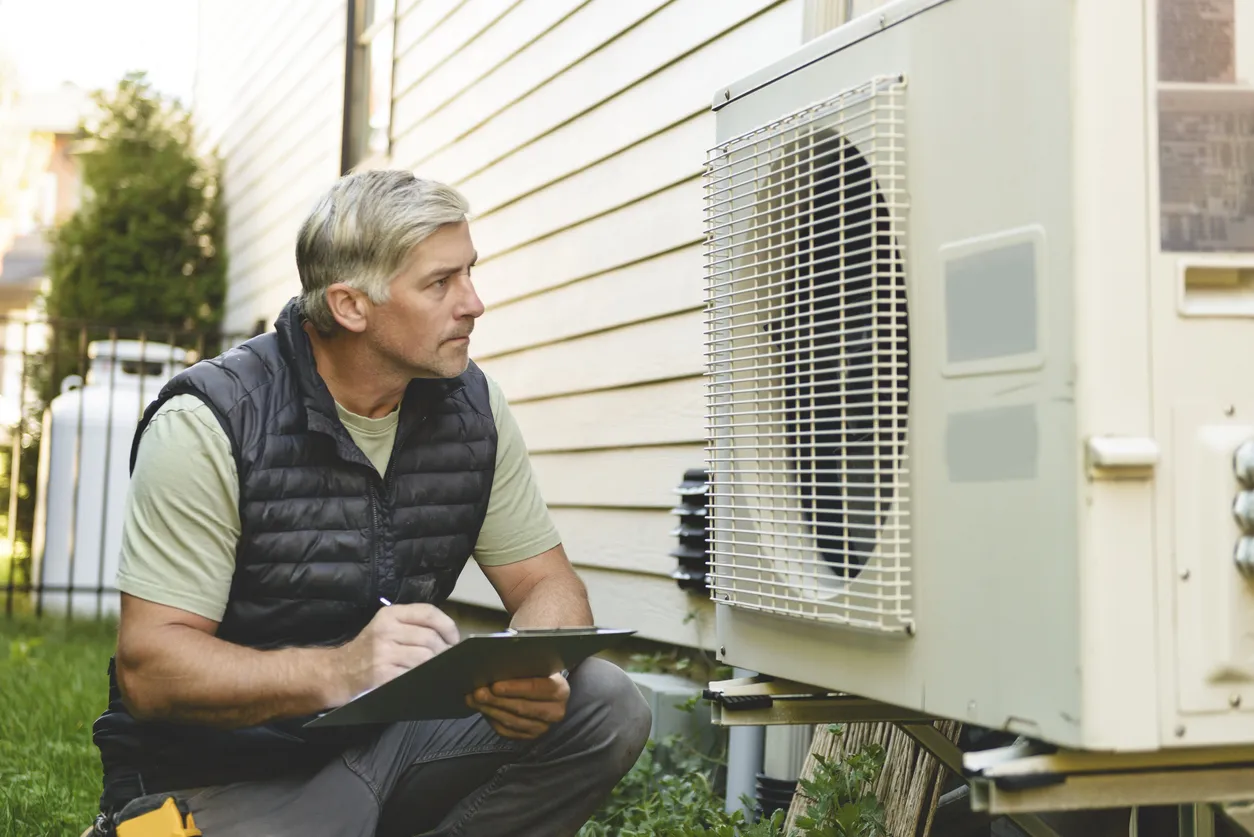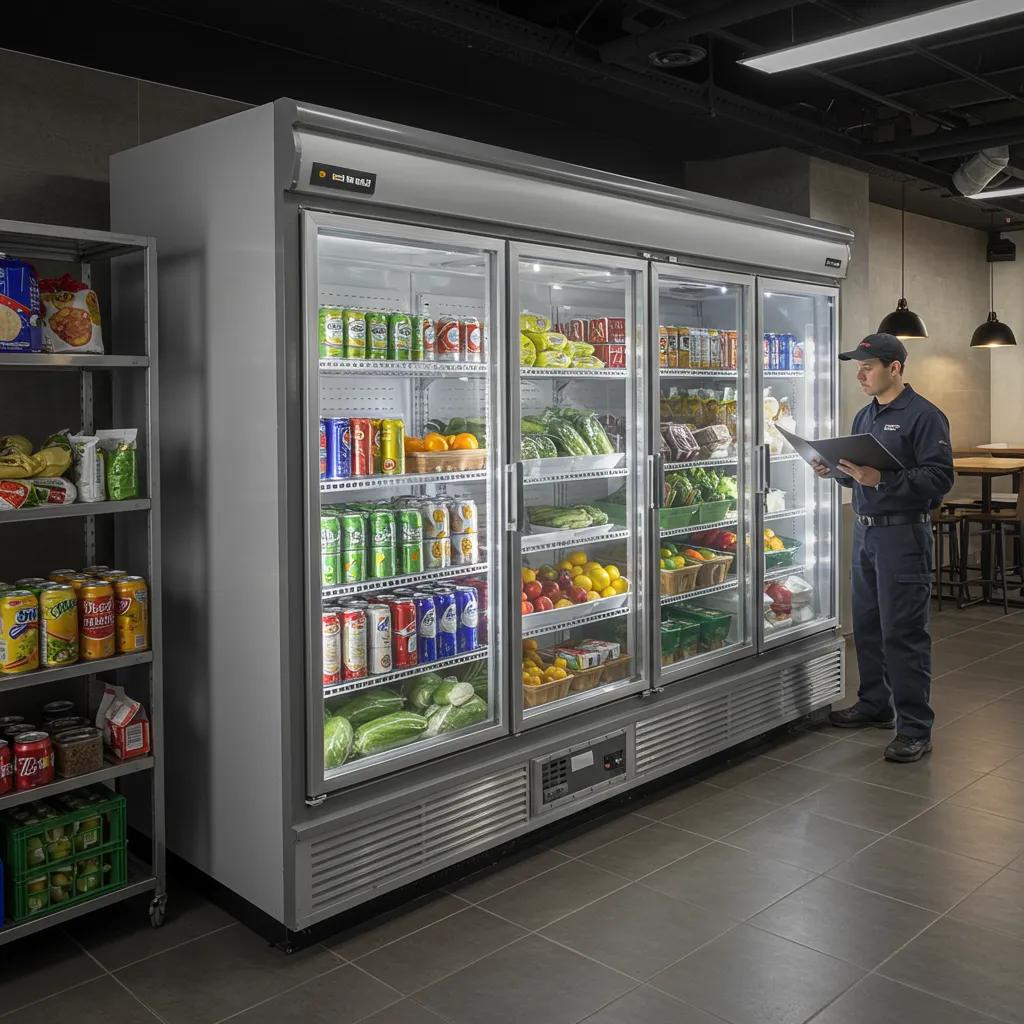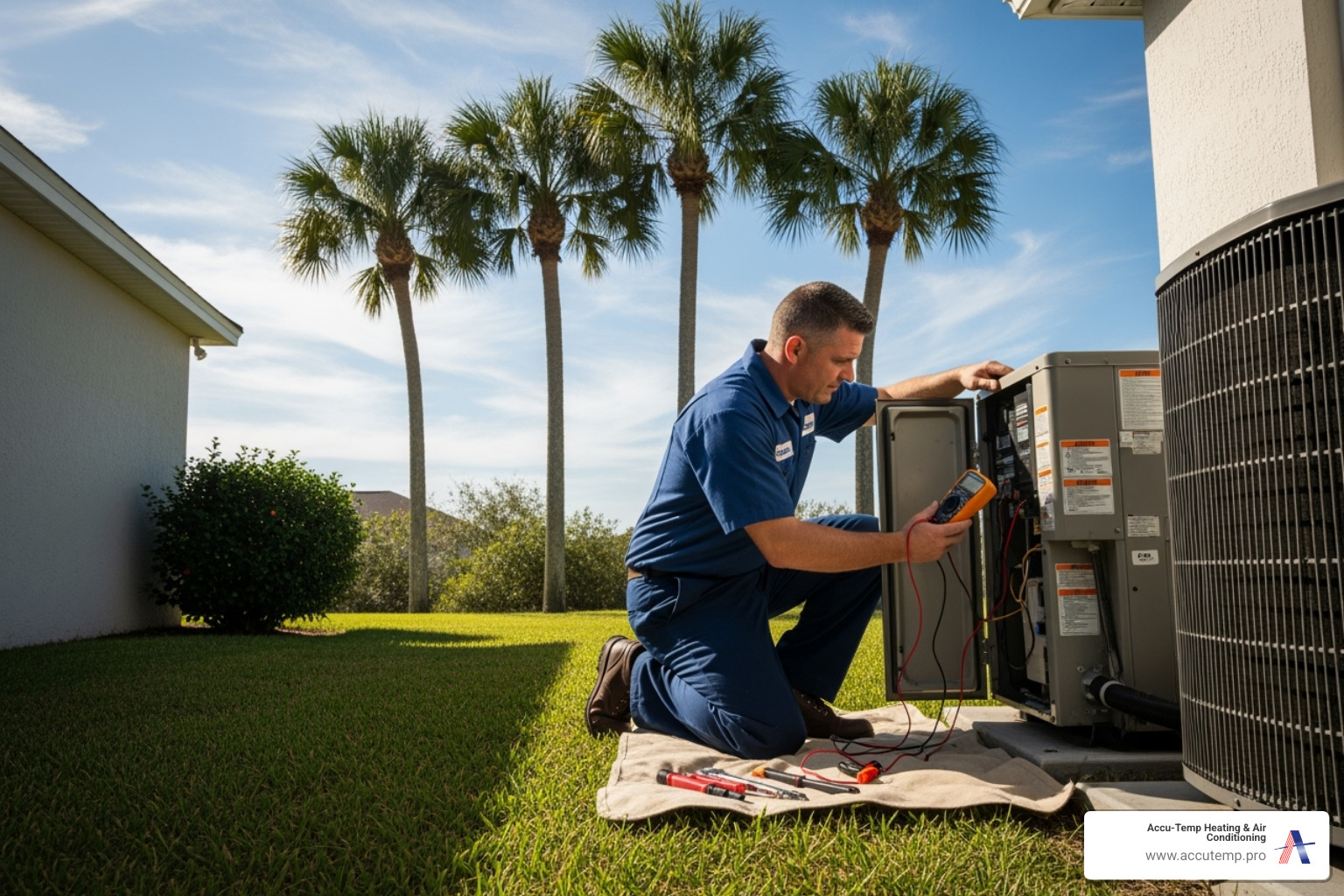Summer in Daytona Beach puts a lot of pressure on your AC system to keep up with rising indoor temperatures, and many homeowners start to notice strange sounds coming from the unit when it’s running. One of the most alarming sounds is a grinding noise — loud, irregular, and typically hard to ignore. Most homeowners don’t know what it means, but the sound can point to a serious issue that shouldn’t be brushed off.
If your AC system starts making a grinding noise, it’s likely coming from the compressor. The compressor is one of the most important parts of a cooling system. It keeps refrigerant flowing and helps your home stay at a comfortable temperature. When it starts making noise, there’s a bigger problem inside that needs attention. And for homeowners in Daytona Beach, catching it early could mean the difference between a fast fix and a costly replacement.
What Causes Grinding Noises In Your AC Compressor?
Grinding is never a normal sound from your AC system, especially from the compressor. This part of your system runs almost nonstop throughout the summer and is built to run quiet. Any sudden shift in sound likely means something inside the unit isn’t working how it should.
Here are some of the most common causes of a grinding noise in your AC compressor:
– Worn-out bearings: Over time, the bearings that help the motor shaft turn can wear down. When they loosen or break, they can cause metal components to rub together.
– Loose or damaged belts: If your compressor uses a belt-driven system, worn or frayed belts can cause a grinding or squealing noise as they struggle to stay in alignment.
– Broken motor parts: If parts inside the motor itself are loose or cracked, they can scrape against surrounding parts while the compressor runs.
– Debris intrusion: Dirt, leaves, or small branches caught in the compressor casing can grind against internal parts, especially if the condenser fan pulls them in.
– Lack of lubrication: Compressors need adequate oil and refrigerant to run smoothly. If levels run low, metal can scrape against metal.
Every one of these issues can create more damage if ignored. That screech or crunch you hear might be the sound of parts wearing down past the point of repair. It can also lead to overheating or a complete system failure if the compressor shuts down. So if your system is making a grinding noise, it’s best to act quickly.
The Importance Of Addressing AC Compressor Noises Fast
An AC compressor that makes a grinding noise isn’t just annoying — it’s a signal that something inside your system is going wrong. Ignoring that sound can lead to expensive repairs or replacements down the road. That’s because the compressor doesn’t just handle airflow. It manages the flow of refrigerant, regulates pressure, and is responsible for your home feeling cool when the heat outside won’t let up.
Even a small problem in this part of the system can:
– Overwork the motor and other parts of the system
– Cause a drop in cooling performance
– Lead to higher energy bills over time
– Shorten the lifespan of the entire AC unit
Letting a grinding noise continue unchecked often leads to the compressor locking up or needing full replacement, which means more time without cool air in your home and more money spent to get it working again. In some cases, a new compressor might be just as costly as replacing the entire system, depending on how far the damage has spread. One Daytona Beach homeowner heard a grinding noise midway through summer, put off calling anyone for weeks, and ended up needing their entire system replaced after the compressor seized.
Catching compressor noise early gives you a better chance of solving the problem before it snowballs. When treated quickly, many of the smaller problems — such as low oil or foreign debris — can be fixed with basic service and maintenance. But ignoring those sounds can create long-term issues that affect your comfort, safety, and budget.
Steps to Take When You Hear Grinding Noises
If your AC is making a grinding noise, the worst thing you can do is ignore it or let it run like normal. It’s important to switch the system off right away. Letting it continue may cause further wear or even destroy internal parts. Turning it off helps prevent damage from spreading and gives you a chance to figure out what’s going on without risking more issues.
Once the unit is powered down, take a safe look at the outdoor portion of your AC system. Check for obvious debris around the condenser. Things like leaves or small branches can get pulled into the unit and cause grinding against the fan or internal components. Don’t stick your hands inside or try to remove internal parts, but take note if anything looks cracked, dented, or misaligned from the outside.
If you don’t see anything visibly wrong but the noise keeps happening when you turn it back on, stop using the system and request help from our technicians. Grinding noises almost always require internal inspection. Our professionals are trained to safely open and evaluate key parts like the motor assembly, fan blades, and compressor internals. We use proper testing tools to rule out or diagnose things like loose bearings, low lubricant levels, or belt alignment issues. Without the right tools and experience, trying to investigate it yourself can make matters worse or lead to personal injury.
Time is a factor too. The longer a grinding compressor is left without attention, the more expensive the fix tends to get. So if the noise returns even briefly when the unit restarts, hold off on using your cooling system and let a professional handle the diagnostics before starting it again.
Preventive Measures to Avoid Future Noises
Preventing future compressor noise starts with regular attention. AC systems can stay quieter and last longer when they receive routine care, and that doesn’t just mean changing out filters every now and then. Here’s what homeowners in Daytona Beach should build into their system care routine:
1. Clean or replace air filters consistently. Dirty filters put more stress on the system and restrict airflow, which can impact other components in the long run.
2. Keep the outdoor condenser unit clean. Trim back any plant growth and regularly remove leaves and dirt from around the base of the unit.
3. Don’t block vents or returns inside your home. Poor circulation increases strain, especially during high heat months.
4. Pay attention to any new sounds or issues during operation. If something seems different, like airflow changes or odd odors, make note of when it started.
5. Have a technician perform seasonal check-ups before peak summer use. These visits allow worn parts to be replaced early, refrigerant levels to be tested, and belts or motor components to be inspected before they fail.
Smaller issues often give subtle warnings before they become large-scale problems. Making maintenance part of your regular home upkeep prevents unexpected surprises, like losing cooling during a heatwave or needing to replace the compressor after what seemed like a minor issue. Staying consistent with care also lowers the chance of running into premature compressor failure or excess utility costs due to strain.
Rest Easy With Expert HVAC Services in Daytona Beach
Strange compressor sounds can feel overwhelming, especially if you’re not used to dealing with HVAC systems. But a grinding noise doesn’t have to lead to a full breakdown if it’s handled quickly and correctly. Acting as soon as you hear it, shutting off the unit, and connecting with trained professionals can make a big difference in the outcome.
Homeowners in Daytona Beach who stay ahead of maintenance and watch for early warning signs usually avoid the high cost associated with long-term damage. Regular inspections, preventive maintenance, and prompt response to unusual noises keep your AC system working as it should during the hottest months. Taking care of your compressor today helps ensure you won’t be left without cooling tomorrow.
If compressor noise persists and you need dependable HVAC services in Daytona Beach to prevent further damage and maintain your cooling system, trust Accu-Temp Heating & Air Conditioning to diagnose and resolve the issue efficiently. For a quick estimate or to book a service visit, please contact us today.




